Tell People The Nuclear Deal Is Dead, Iranian Lawmaker Says
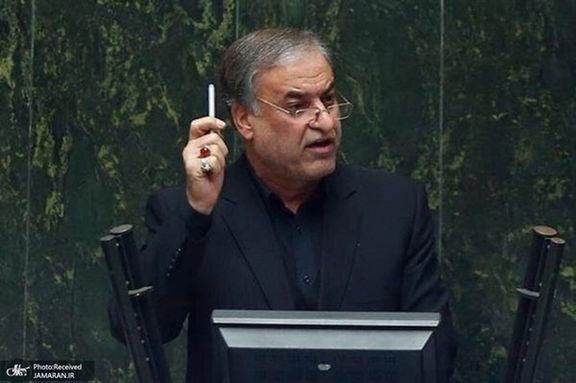
An Iranian lawmaker has called on the authorities to tell the people that the Vienna talks to restore the 2015 nuclear deal will yield no results.

An Iranian lawmaker has called on the authorities to tell the people that the Vienna talks to restore the 2015 nuclear deal will yield no results.
Mahmoud Ahmadi-Bighash, who is a member of the parliament's National Security and Foreign Policy committee, said on Saturday that there is no news about the revival of the Joint Comprehensive Plan of Action (JCPOA) because it has reached a dead-end.
He said the fate of the JCPOA is entangled with the lives of people and they are subconsciously invested in the talks, therefore “if we tell people the truth about the JCPOA... they will know what to do”.
“Our differences with the United States and the Europeans are fundamental”, he noted, saying that “the Americans believe that we should give up our principles while we want them to give up their arrogant and bullying behavior”.
Ahmadi-Bighash added, “We cannot give up our revolutionary principles because they are inherent in our religious obligations”, claiming that the issue of the Revolutionary Guard being listed by the as a terrorist organization by the US is just an excuse.
He praised relations with Russia and China and emphasized the Islamic Republic's motto of "self-reliance", but except Israel, the lawmaker said, Iran should have relations with all counties.
Negotiations, which started in Vienna in April 2021 to revive the Obama-era nuclear deal, JCPOA, have been on a protracted pause since March 11, as the Islamic Republic demanded removing its Revolutionary Guard (IRGC) from a US list of terrorist organizations.
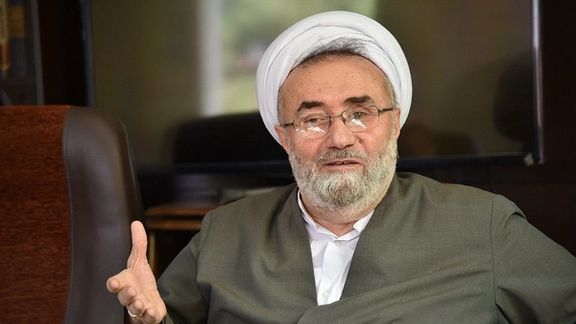
The editor of one of Tehran's leading pro-regime newspapers has called on President Ebrahim Raisi to step down if he cannot solve Iran's economic problems.
While rising bread prices have turned even some of Raisi's supporters against him, Massih Mohajeri, the editor of Jomhouri Eslami (Islamic Republic) newspaper who usually criticizes the administration's policies wrote in an editorial on Saturday, "Now that it has become clear that you cannot solve the problems, step down bravely and leave the job to those who can do it and save the people from this dangerous quagmire."
The editorial charged that "Media close to the administration label those who criticize you for the problems you have created as counter-revolutionaries who work for Israel and the United States." It went on to say that some of Raisi’s supporters are also protesting the government's policies.
Mohajeri further asked, "The president should say how much time does he need to understand that problems cannot be solved by just talking and the government cannot be run in this way." He added: "Blaming all shortages on smugglers is not a solution,” and if that is the problem, why the government does not stop them.
Ukraine and nuclear talks with the US
"If the problem of flour shortage is caused by the war in Ukraine, why you don’t condemn Russia's aggression against Ukraine and not try to stop Vladmir Putin from continuing the invasion, which threatens the livelihood of a major part of the world?" Mohajeri asked Raisi.
He also asked Raisi why he does not do anything to reach an agreement with the United States. "You said you will not tie the country's fate to the [nuclear] negotiations, but by not doing anything, you have created new problems for the nation."
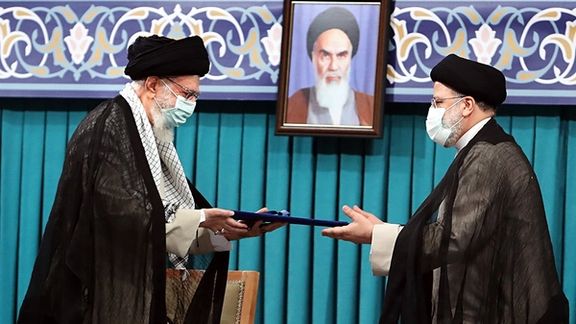
Many in Iran know it is Supreme Leader Ali Khamenei who decides key foreign policy and other state matters, but semi-official media would not dare to blame the economic crisis directly on Khamenei.
Mohajeri addressed Raisi that "If the instability of the government and the current dangerous situation have not been created by infiltrators, then they must be attributed to the poor management of your economic ministers."
He reminded that the price of bread in Iran did not rise even during the war with Iraq in the 1980s. He warned that raising the price of flour and rationing bread are like setting fire to gunpowder. Further warning that there are several individuals affiliated with the deviant group [jargon referring to those close to former President Mahmoud Ahmadinejad], Mohajeri charged that these elements could be attempting to unseat the current government and asked Raisi to take this warning seriously.
Economic crisis main topic of media
On Saturday, most newspapers in Tehran which are usually silent about economic problems, covered the shortage of these items in extensive stories, although the government's own newspaper, Iran, and the hardline daily Khorasan claimed that people were happy about the situation and "over 62 percent of Iranians said they were happy about the government's performance in a poll that was conducted before the unusual bread price rise."
At the same time, Mostafa Hashemi Taba, a former presidential candidate, said in an interview published by Didban Iran website that "the Raisi Administration has totally lost its social capital." He said the government wants to be portrayed as a revolutionary government abroad, but it wishes to adopt liberal economic policies inside the country. He said there are only two solutions to the problem: Either the government should be able to distribute all of the people's needs, or it has to resort to rationing essential commodities.
Meanwhile, economist Hossein Raghfar told Khabar Online website that the government's policy over bread is not transparent. He dismissed the official statements about flour being smuggled out of Iran as "fabrication" and maintained that the problem is the falling value of the currency, which he said rose from 10,000 rials per dollar to 35,000 rials in 2011, and from 30,000 rials in Janyary 2018 to 320,000 rials in January 2021. He charged that rich people in power benefitted from all of these changes while they ignored the interests of the ordinary Iranians.

Iran’s currency, rial hit a four-month low on Saturday against the US dollar, as soaring bread prices created political and economic uncertainty in the country.
The US dollar rose to 285,000 rials in Tehran, the highest point since early January, when the currency was marginally recovering from previous lows on optimism over nuclear negotiations with the West. After talks in Vienna came to a standstill in mid-March, the currency began gradually losing its value again.
The rial has fallen almost ninefold since late 2017 when signs emerged that former US president Donald Trump intended to withdraw from the 2015 nuclear agreement, JCPOA, and impose economic sanctions on Iran.
Trump eventually pulled the United States out of the Obama-era agreement in May 2018 and imposed oil export and other sanctions that began to squeeze Iran’s oil-dependent economy. High double-digit inflation and a falling currency followed, leading to at least two years of a deep recession.
The falling currency makes everything else more expensive for people who earn depreciated rials. Key foodstuff, such as cooking oil, and 15 million tons of wheat are imported annually. In addition, animal feed is also imported and a falling currency makes meat and poultry more expensive. Most Iranians have stopped buying meat according to industry people in Iran.
This week the government finally acted on an earlier decision to stop a subsidy in the form of cheap dollars for imports of essential commodities, such as flour and animal feed. Immediately, cooking oil disappeared from supermarket shelves and flour prices increased fivefold, leading to a bread crisis.
The government’s handing of the price jump has been haphazard, claiming to be ready to provide cash assistance to citizens for buying bread but offering contradictory information on how the process would work. Pundits and citizens have reacted by saying that apparently the government failed to prepare for the eventuality.
There were reports on Friday of bread protests breaking out in the oil-rich Khuzestan province
President Ebrahim Raisi and his oil minister Javad Owji have been insisting that Iran’s illicit oil exports and revenues have risen in the past year, with evidence that Iran has been exporting anywhere between 750,000 to one million barrels per day. However, the economic impact of higher oil revenues is nowhere to be seen.
The key to lifting US sanctions and getting a reprieve form economic pressure is reaching an agreement with the United States over the nuclear issue, but talks in Vienna have stopped since mid-March.
As bread prices shot up almost fivefold in two days, economy minister Ehsan Khandouzi promised Saturday that the government will start a system of cash assistance to buy bread, but his statement was vague as to who what income groups would be eligible to receive the cash subsidy.
Meanwile, Hamshahri newspaper reported that the government is also planning to hike the price of cooking oil and gasoline, to begin reducing decades of subsidies paid by oil export income.
A gasoline price hike in November 2019 led to nationwide protests in which security forces shot dead at least 1,500 people and arrested 8,000.
Prices for all these commodities are very low in Iran compared to other countries, but so are wages. An Iranian worker earns an average of $150 per month and when one flatbread costs one dollar, the family can only afford to buy 3-4 breads a day, and nothing else.

The Biden administration's negotiating team have reportedly acknowledged in private that an agreement that would go beyond curtailing Iran’s nuclear program is no longer possible.
Politico cited multiple people familiar with classified Congress briefings on the subject that the two Iran-related motions passed in the Senate on Wednesday were a warning shot to the US team negotiating restoring the 2015 agreement with Tehran.
Although the motions were non-binding, the vote was seen as a test run of the bipartisan rebuke that would likely happen if Washington and Tehran clinch an agreement that does not address Iran’s non-nuclear activities and removes Iran’s Revolutionary Guard (IRGC) from the list of foreign terrorist organizations.
The measures -- that for the first time forced lawmakers to go on record about the key sticking points in the year-long negotiations in Vienna -- were also hailed as modest victory for Republicans who have been urging the Biden administration to walk away from the talks, now in limbo for weeks now.
The first vote on Wednesday was proposed by Senator Ted Cruz that called for maintaining terrorism-related sanctions on Iran’s Central Bank to limit Tehran’s cooperation for China, while the other – led by Senator James Lankford instructed Senate conferees to make sure that a House bill would include language that the Biden administration cannot remove the terror designation of the IRGC.
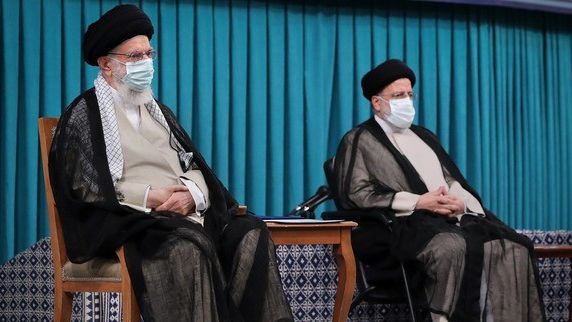
Ten months after conservatives in Iran gained full control of the government, many are now complaining about lack of efficient governance amid economic crisis.
While the assumption behind the idea of creating a consolidated conservative government was to make it agile and efficient, even supporters of the government say a hardliner president and parliament have been unable to feed the people.
In recent weeks, prices of essential food items, such as cooking oil, flour and sugar have at least doubled.
According to moderate conservative Khabar Online, what was initially a dream, has become a challenge for the Islamic Republic. The heavy political cost of consolidation, wrote the website, fell on the shoulders of everyone including those who had designed the new system in which the main criterion for appointment of government officials is their loyalty to a single political group.
That group has one single trait and that is loyalty to the Supreme Leader Ali Khamenei.
The process started with facilitating a landslide victory for hardliners in the 2020 parliamentary elections and completed by doing the same in the 2021 presidential election, mainly by eliminating all the candidates that were not part of the hardliner conservative camp. Later in 2021, Khamenei appointed a well-known hardliner as Judiciary Chief, completing the handover of all power to loyal hardliners who soon got rid of anyone in the government who was not in their camp.
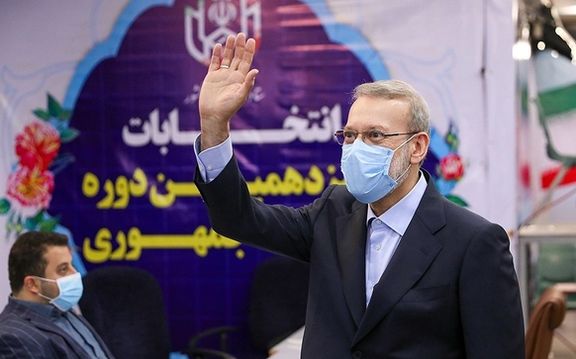
The keyword throughout the entire process was "change." And what was to be changed was presumably the worsening economic situation. However, ten months later, government officials including the president still blame "those who created the current situation.”
However, few openly say that the economic crisis, reflected in rapidly increasing food prices, is to an extent the result of sanctions imposed by the United States that can only be lifted if Khamenei agrees to resolve Iran’s nuclear dispute with the West.
Analysts coming from various political factions, even those at the IRGC-linked Fars news agency were saying that "the root cause of the country's problems was corruption, coupled with plundering of national resources by a well-connected few." They also thought a consolidated government can put an end to all that by getting rid of political rivalries.
But rivalries did not end. Last week, Majles Speaker Mohammad Bagher Ghalibaf suggested that the controversy about his family's luxury shopping in Turkey was engineered by his political rivals with the assistance of some intelligence agencies. Later in the week, a letter signed by 233 out of the 290 lawmakers was sent to Khamenei expressing support for Ghalibaf. This week, several lawmakers complained that the letter was supposed to be containing a pledge of allegiance to Khamenei and that they were not told it was to express support for Ghalibaf.
Meanwhile, while Raisi had promised to form a non-factional cabinet, he chose nearly all his ministers from among the ultraconservative Paydari Party and the officials of former President Mahmoud Ahmadinejad's cabinet. The parliament also became divided into at least four factions of Paydari, Ahamdiejad's men, Ghalibaf's neo-con aides and traditional conservatives.
Former lawmaker Gholam Ali Jafarzadeh Imanabadi has said that the government has failed and now those who engineered the consolidated system should be held accountable. Some lawmakers includingMostafa Reza Hosseini Ghotbabadi have gone further and called on parliament to table a motion to unseat the President for incompetence. Ghotbabadi said that the Majles has been mulling the idea of Raisi's incompetency at least twice in recent months.
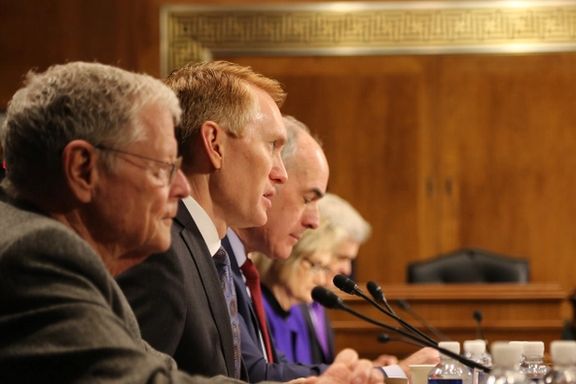
The United States Senate Wednesday sent a strong message to the Biden administration opposing its current negotiating posture on the Iran nuclear deal.
The Senate passed a non-binding measure as an instruction to Senate representatives who will work with the House on a larger bill. It secured the votes of 16 Democrats for a total of 62 senators in favor.
Important Democrats such as Senate Majority Leader Chuck Schumer (D-NY) and Sens. Richard Blumenthal (D-CT), Cory Booker (D-NJ), Ben Cardin (D-MD), Chris Coons (D-DE), among others voted for the measure.
The measure introduced by Sen. James Lankford (R-OK) opposes entering into an agreement with Iran that only addresses its nuclear program, leaving out the issue of ballistic missiles and regional role, and demands that US sanctions on the Revolutionary Guard (IRGC) not be removed.
The House of Representative and the Senate are set to push forward with HR 4521, a long-stalled bill authorizing hundreds of billions of dollars to boost the country's ability to compete with Chinese technology, with Senate votes on motions addressing issues including energy policy and Iran sanctions.
This requires reconcilitation between the House resolution and Senate demands to reach at a final bill. Wednesday’s Senate votes on sevaral measures are instructions to its conferees when they meet to reconcile with the House.
The Lankford measure that was passed with a strong majority was one of these instructions and told the Senate conferees to insist on "provisions addressing the full range of Iran’s destablizing activities, including development of the means of delivery for [nuclear] weapons…support for terrorism, and evasion of sanctions…in the trade of petroleum products with the People’s Republic of China."
It also instructed that sanctions on the Islamic Revolution Guard Corps not be lifted and not to revoke its designation as a Foreign Terrorist Organization.
Earlier on Wednesday, the Senate voted 86-12 - with strong bipartisan support - for a similar "motion to instruct", sponsored by Republican Senator Ted Cruz, seeking a report on terrorism-related sanctions on Iran and saying such sanctions are necessary to limit cooperation between China and Iran.
If they become law, the Lankford and Cruz provisions could complicate delicate negotiations on the Iran nuclear deal, although western officials have largely lost hope that the pact can be resurrected, four years after former Republican President Donald Trump abandoned it in 2018.